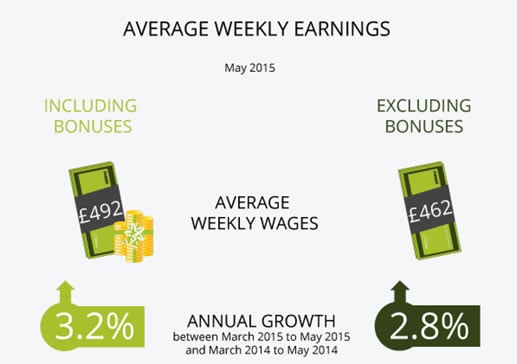British GBP/EUR Conversion Sees Best Rates Since 2009

The pound to euro exchange rate has achieved its best level of 2015 following four successive days of gains.
Thursday has seen sterling / euro remains above the previous high seen on the 29th of June on the back of fresh euro weakness, largely inspired by the European Central Bank.
The last time we saw these levels was in the wake of an announced Greek referendum and the imposition of capital controls on Greek banks.
The gains never stuck ensuring many with currency transfer requirements missed out on decent levels.
At the time of writing we are seeing the inter-bank market rate at 1.4337. High street banks are offering a retail rate on transfers around 1.3936.
Independent FX providers are quoting the pound to euro exchange rate closer to the market at 1.4165.
Good News for Sterling - UK Pay Grows
The main driver of the pound sterling context in mid-month is news that UK pay packets are easily outstripping inflation.
One of the central factors the Bank of England is watching when it comes to deciding on future exchange rates is so-called slack in the economy i.e when pay packets increase it tells us that workers are being fully utilised and able to command higher wages.
Higher wages threaten higher inflation which the Bank of England will try and fight via lifting interest rates.
And, higher interest rates = a higher exchange rates.

“Comparing March to May 2015 with a year earlier, pay for employees in Great Britain increased by 3.2% including bonuses and by 2.8% excluding bonuses,” says the ONS.
However, enthusiasm for the data was tempered by the news that there were 30.98 million people in work - this was 67,000 fewer than for the 3 months to February 2015, the first quarterly fall since February to April 2013.
“Although UK unemployment levels have crept a shade higher it still remains the envy of Europe, but coupled with slipping average earnings this makes a mockery of the BoE governor Mark Carney’s charade on Tuesday that interest rate rises are coming,” says Connor Campbell at Spreadex in London.
This brings us to another fundamental reason for GBP strength. The Bank of England’s Mark Carney told the Treasury Select Committee on Tuesday the 14th that households must prepare for higher interest rates.
We argued that this is not much of a game-changer though as this view is not something new. Nevertheless, currency traders took the opportunity to bid the pound higher on the news and bring to an end a protracted period of profit-taking on the previous rally.
Forecast for the Pound to Euro Exchange Rate
This brings us to the projections regarding the pound v euro - where next?
As the below graph shows us that there is a generally bullish tone to proceedings since May with each dip proving shallower than the last.
However, we have not been seeing higher highs confirming that the resistance zone lying around 1.42 remains strong and could prove a centre of gravity for the GBP-EUR going forward.
We think something has to give and with no reason to fundamentally back the euro we are forecasting this situation to be resolved via a higher pound.
Look for the 1.43 to come into view soon and any pullbacks to find support around 1.4150.
Greece Saga Grinds On, But Does it Matter?
One can’t discuss the euro without an obligatory nod to the Greek debt saga.
The Greek parliament has OK's the package of financial changes required to secure a further loan from European partners.
The next step now lies with the creditors.
Finland could have been another big obstacle for Greece given the pro-Grexit stance of the country’s deputy Prime Minister Timo Soini and the bearish comments of finance minister Alexander Stubb throughout the last few months.
However, in a market boosting move the Finnish parliament backed the deal, giving Stubb the mandate to discuss the conditions of a third bailout, and importantly putting more pressure on Merkel and co. ahead of Friday’s German vote.
Currently the two other key Greek issues remain unresolved.
Reports suggest that the €7 billion Greek finance bridge has been ‘agreed in principle’, but likely won’t be confirmed until after the technical details have been thrashed out. The fairly crucial factor of where the funds will actually come from, however, still remains unclear, with the EFSM still the most likely source.
